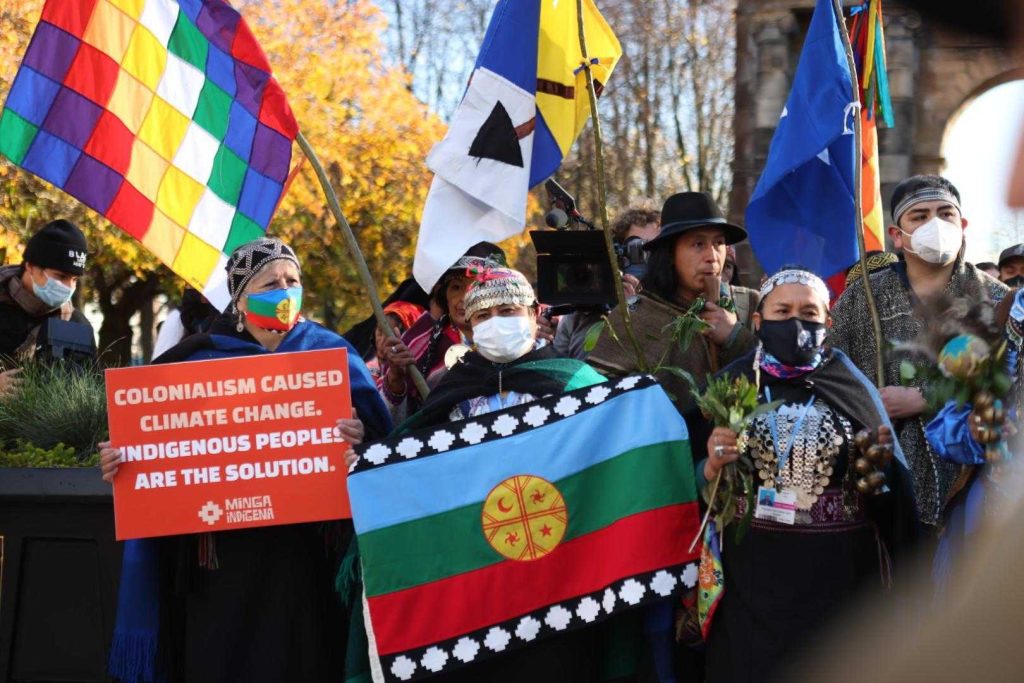COP26: optimism of the will

Greta Thunberg telling it like it is, in advance of the COP26 meeting in Glasgow
Allan Todd writes: If Oscar Wilde was alive to write a play about COP26, he would (probably!) title it: ‘The Importance Of Being Optimistic.’ Greta Thunberg’s assessment of the outcome of COP26, on the other hand, was just more “Blah! Blah! Blah!” Even Alok Sharma, COP26’s President, was visibly upset about the final Agreement’s serious limitations. The Guardian, in its 14 November editorial, summed up the COP26 Agreement as “unfinished business” bemoaning the fact that, because the global climate movement “is not strong enough,” the fossil fuel companies and their backers “outgunned supporters of the immediate decarbonisation that is needed, if the goal of limiting temperature rises to 1.5C is to stay within reach;” and saw “ramping up the pressure on polluters – both nations and companies” – as “the obvious answer.”
Such assessments are largely correct: as the most recent Climate Action Tracker report pointed out, the ‘pledges’ made at the start of COP26 in Glasgow – even if all are met – still have us heading for at least a 2.4C increase in global heating, not the aimed-for limit of 1.5C. And, as the Sixth Assessment Report of the UN’s IPCC warned at the end of September, the current rate of greenhouse gas (GHG) emissions means we are on course for a 2.7C increase by 2100.
Climate scientists say that GHG emissions must fall by about 45% by 2030, if global temperatures are to stay within 1.5C of pre-industrial levels. Thus time is most definitely running out – 2050 is certainly far too late for achieving Zero Carbon and thus avoiding catastrophic Climate Breakdown.
Overall, COP26 showed what has been apparent for at least the past 30 years: that, ultimately, the capitalist system isn’t capable of responding in any rational and meaningful way to the mounting Climate Crisis. This is why ecosocialist movements – ever since the 1980s – have been working for a radically transformative ‘System Change’ as the only way of ending the ecological destructions, as well as the rising inequalities, of capitalism. In fact, these two aspects are closely interlinked – during COP26 itself, Democracy Now hosted a discussion which made clear how the extreme inequalities associated with neoliberalism are in fact fuelling the Climate Emergency.
However, as Antonio Gramsci – imprisoned by Mussolini, at a time when fascism was seemingly unstoppable, and pushing the entire world into what soon became a Learesque “hell-black night” – nonetheless famously urged: “Pessimism of the intellect, but optimism of the will.” He argued for such an approach because – whilst it’s essential to have a realistic awareness of just how bad things are – it is nonetheless also imperative to keep struggling for a better future: failure to do so means nothing will improve.
The good news, from an ecosocialist perspective, is that Glasgow showed there is now a much-strengthened global climate movement. This climate movement is now bigger, broader and more radical than ever before, resulting in billions of people around the world now demanding climate action. As organisations such as Global Justice Now and War on Want – both of which are disappointed by the final COP26 Agreement – point out, the Climate Justice movement is bigger and more active than ever before. The young people and activists – including delegations from the Global South and various indigenous communities – were thus able to maintain an impressive and constant pressure on proceedings, both on the streets in Glasgow and elsewhere.

Some of the indigenous groups from the Global South, present at COP26
This movement, rightly angered by the ‘greenwash’ and the failure to take the immediate measures needed – especially for those on the frontline of the Climate Crisis – will undoubtedly continue to take the struggle forward.
Positives
And, in fact, there are some positives to be taken from COP26 which the global climate movement can take forward in the on-going struggle for meaningful climate action. Firstly, COP21 in Paris in 2015 set an official policy of keeping the increase in global heating to 2C – 1.5C was only reluctantly tagged on to placate those countries of the Global South already experiencing extreme climate impacts. But, in 2021, the slogan ‘1.5 to stay alive’ was centre-stage, with much of the discussions being about how to achieve this limit. As the global campaigning organisation, Avaaz – which mobilised massively for COP26 – said: “…the deal signed at the UN climate talks keeps our fight for survival alive – just.”

Highlighting the Caribbean campaign for 1.5
In addition, COP26 for the first time fully accepted that the Climate Crisis is largely the result of the operations of the fossil fuel industries. Also significant was that at least some countries have accepted that subsidies to those companies need to end, and have committed to stop financing fossil fuel projects overseas. A further ‘positive’ to be taken from Glasgow is that progress in meeting COP aims will now be reviewed yearly, instead of every five years. All these gains give real targets for climate activists to campaign on – and to step up the pressure on governments to take the steps necessary to achieve that ‘goal’ of 1.5C.
Negatives
Nonetheless, it has to be recognised that the overall outcome from COP26 is a negative one. This was recognised by, amongst others, Avaaz: “We secured some crucial victories in the battle to save our future, though the agreement still falls far short of what’s needed.” In particular, although it was generally recognised that coal is a huge problem, several countries were, in the end, able to get the call to ‘phase out’ coal-fired power generation downgraded to just ‘phase down.’

A last-minute ‘negative’ from COP26
However, there was nonetheless recognition that coal is the biggest single threat to the future of the planet which, as Greenpeace has recognised, is definitely “a nail in the coffin of coal.”
COP26 also failed to address the role of the intensive meat and dairy industries – responsible both for huge GHG emissions and for massive destruction of natural habitats, including rainforests. In addition, despite yet more promises and an acknowledgement – for the first – of the principle of climate loss and damage reparations, COP26 is still failing to give the countries of the Global South the financial resources they need to cope with the ever-worsening Climate Crisis impacts they are already suffering. Increasingly, such failures will result in millions more climate refugees fleeing the ever-worsening effects of capitalism’s Climate Crisis.
Of course, the ultimate ‘negative’ is that, despite the magnificent increased pressure from the climate movement, the neoliberal elites are still refusing to treat the Climate Crisis in a way that they treated crises such the Second World War, the 2008 banking collapse or even the Covid pandemic. Instead, they avoided making enforceable commitments, and still placed their hopes on technological ‘fixes’ and carbon trading. It is likely, for instance, that Johnson will go ahead with some 40 new fossil fuel projects; whilst Biden, just four days after COP26, has approved the largest-ever auction of new oil and gas licences in the Gulf of Mexico – which Trump originally proposed in 2017. This is no doubt why environmental journalist and campaigner George Monbiot has described the overall COP26 Agreement as a “suicide note.”
What next?
The most vital step after COP26 is to follow Gramsci’s advice and not give in to despair. It is thus important to ignore the message that it is now too late to avoid catastrophic Climate Breakdown, with its associated perils of mass starvation, wars over freshwater resources, and a general societal collapse. In particular, despite the many weaknesses and failures of the COP process, it is vital for the global climate movement to continue to organise around it, as a way of raising awareness and mobilising the numbers needed to make ever-stronger demands and, eventually, force real change.
While it is crucial to be aware of the seriousness of the situation, and thus the urgency for real climate action, doom-laden arguments that all we can do now is to ‘adapt’ to such outcomes will only demotivate and demobilise the very movements that are needed to force governments to act.
As Greenpeace said after COP26: “There’s no single moment when it’s ‘too late’ to act on climate change; no cut-off point where we can’t choose a better path. Every ray of hope and inch of progress at COP26 was won through relentless pressure from activists, campaigners and diplomats, especially those on the front line of the crisis. It’s always been this way, and always will.”
And, as indicated above, there are aspects from COP26 that can – and should – be built on. One most definitely to mobilise on is the whole question of fossil fuels – especially new fossil-fuel projects. In the UK, there are already two which should most definitely be targeted: the proposed new coalmine in Cumbria, and the new Cambo oil- and gas-field. We now know that, contrary to earlier ‘promises’, most of the production from these two projects is NOT intended for use in the UK, but will be for export.

A new coalmine in Cumbria – Johnson’s idea of how to be ‘green’!
Other issues which the UK climate movement needs to campaign on in the coming months include two big ways of reducing GHG emissions: transport, and insulating UK homes – the latter most recently highlighted by the actions of Insulate Britain. While moves to replacing petrol/diesel vehicles with electric ones will do much, initially, to greatly reduce air pollution which is responsible for so many deaths each year, climate activists should be pushing for free and much more frequent public transport powered by clean energy – in both urban and rural areas. In addition, there needs to be a mass campaign to retro-fit all the UK’s cold and damp housing – most of which is lived in by the less well-off sections of society. Both those campaigns, as well as reducing carbon emissions, would greatly benefit those living in fuel poverty AND provide plenty of good ‘green’ jobs, thus ensuring a just transition.
A mass movement that is to be able to put sufficient pressure on the government to implement such policies will need to involve wide sections of civil society – including the trade union movement. One way of achieving that is by promoting the idea of an Ecosocialist ‘Green New Deal’ – as argued in a recent article by Mark Douglas for Green Left, one of Left Unity’s partners in the Ecosocialist Alliance.
The potential is there – and it is especially encouraging that trends within Extinction Rebellion continue to reflect the growing awareness amongst its activists that the climate movement needs to reach out to and embrace workers in all industries, including the fossil fuel industries.
Worldwide, it is encouraging to note that over half of what is called the ‘working class’ is under 25! And that working class – often called the ‘precariat’ – is increasingly employed in non-unionised low-paid insecure jobs, often on zero-hours contracts and paid less than the minimum wage. They could well become a powerful agency for change. The potential for a mass movement is thus huge – and will be built in struggle for the climate actions mentioned above. More immediately, we should start mobilising for the Cairo COP next year, calling for the partial gains from COP26 to be implemented and extended.
As Alan Thornett, author of Facing the Apocalypse – Arguments for Ecosocialism, has recently pointed out, to get the climate action needed “will require the broadest possible coalition of forces ever built.”

Alan Thornett’s comprehensive book on the climate and ecological crises, and the need for ecosocialism.
What’s needed now is to escalate civil resistance to specifically target those companies, financial institutions and government agencies that are refusing to take the climate actions needed to prevent Climate Breakdown.
Rather than continuing with blocking roads, what’s required are actions that temporarily close down the operations of the banks and private financial institutions that continue to fund fossil fuel projects; the offices and outlets of the fossil fuel companies; and government offices linked to climate inaction. In March 2020, Greenpeace activists managed to shut down 95 branches of Barclays Bank – the UK’s worst ‘dirty bank’ as regards funding fossil fuel projects.

How to hit the capitalist carbon machine WITHOUT blocking roads
Frequent and widespread actions like this can disrupt the daily activities – and profitability – of the ‘capitalist carbon machine’.
The imperative of ‘System Change’
Ecosocialists, however, recognise that ‘System Change’ is needed to avoid much more than Climate Breakdown alone. The Climate Crisis, in fact, is just one symptom of the dangerous ‘metabolic rift’ that capitalism has created between humans and the rest of the natural world – and cannot be finally fixed in isolation from these other impacts of the capitalist system.
Even George Monbiot has now recognised that capitalism is the problem, cannot in the end be the solution, and thus needs to be replaced by a genuinely sustainable ‘System’.

The ‘System Change’ that’s needed
Watch on YouTube here.
Most recently, the case for such a transformation was set out by W. T. Whitney Jr., in his article Lesson from COP26: Protecting the climate requires anti-capitalist struggle, in which he argues for the building of a “massive people-centred political movement,” involving “a whole range of democratic forces” comprising, amongst others, ecosocialists, socialists and Marxists.
Kate Raworth, in her ground-breaking book, Doughnut Economics, made graphically clear how we are exceeding the ‘planetary boundaries’ of this finite planet, and passing several crucial ‘tipping points’. While William E. Rees, and others, have called attention to the fact that we are currently using the equivalent of the resources of 1.75 planets, instead of the one planet we live on; as well as generating wastes beyond the assimilative capacities of the ecosphere.
For some time, the marking of Earth Overshoot Day has made this clear, by identifying the date each year when we have already used up more resources than Earth can regenerate.

Earth Overshoot Day
In 2020, Earth Overshoot Day was reached on 22 August – delayed by the impact of the Covid pandemic. This year, however, with capitalism’s return to ‘business as usual,’ Overshoot was reached as early as 29 July. So, at current rates of consumption, Planet Earth is well on course for the predicted Overshoot date of the end of June for 2030. Most recently, Extinction Rebellion’s brilliant actions against Amazon’s ‘Black Friday Week’ called attention to the ever-increasing consumption that capitalism requires for its ‘endless’ growth and increased profits:

Extinction Rebellion, ‘Black Friday’ November 2021: calling attention to the fact that ‘Infinite Growth’ on a finite planet is unsustainable
Beyond impacts associated most obviously with global heating – such as acidification of the oceans, melting ice caps and glaciers, desertification, and increasing loss of biodiversity and collapsing ecosystems – there are also those directly resulting from capitalist exploitation: over-fishing of the seas, degradation of arable lands, air pollution, destruction of tropical forests, and loss/toxification of freshwater sources. Linked with all of these is the increasing emergence of zoonotic viruses – the most recent one, of course, being Covid-19. As James Meadway argues in his book Pandemic Capitalism, such viruses – including the most recent Covid variant – are now increasingly associated with the way capitalism operates. Moreover, Meadway warns that the impact of such pandemics will lead to greater control of the workforce, a reduction in civil and democratic rights, and an expansion of state power. This last aspect of capitalism is why Left Unity – along with the rest of the radical left – has vigorously opposed the Tories’ new Police Bill. Anti-Capitalist Resistance, another of Left Unity’s partners in the Ecosocialist Alliance, has in fact just posted an article by Rowan Fortune which points out precisely why such moves need to be stopped.
Ultimately, a fundamental ecosocialist transformation – or revolution! – is needed to replace the in-built destructiveness of capitalism. Part of that will be to put in place an economic system that is not based on perpetual growth but which, along with social and economic justice on a global scale, includes elements of de-growth.
Whilst it may seem that, currently, such a fundamental transformation is not on the cards, History shows that even committed revolutionaries have sometimes been surprised by just how rapidly consciousness can shift and movements can grow – especially in times of deep crisis. In late 1916, Lenin doubted whether his generation would live to see revolution in Russia! More recently, despite his overall pessimistic view of COP26, George Monbiot doesn’t argue that the climate movement should give up. In fact, he points out how the political and economic systems that humans have created can suddenly be ‘flipped’ with astonishing speed if, because of pressures becoming too great, “they are driven past their tipping points.” According to him, such a critical threshold can be reached if just 25% of the population can be won over to support radical change. The ‘Fridays For Future’ movement has shown how quickly large numbers can be mobilised – and it was evident at Glasgow that the energy, organisation and anger of young activists is growing. As Monbiot says: “Our survival depends on raising the scale of civil disobedience until we build up the greatest mass movement in history, mobilising the 25% who can flip the system.”
For an Ecosocialist Alliance
Left Unity’s involvement in the creation of the Ecosocialist Alliance – as well as to widen the struggle for red-green reforms – is also intended to help create the necessary awareness that, ultimately, the ‘System Change’ that is needed is to replace capitalism. One really positive aspect of this has been the ability of the groups involved – Left Unity, Green Left (part of the Green Party), Anti-Capitalist Resistance and, now, also rs21 – to work harmoniously together; in the past, sectarianism has been a real hindrance to building effective campaigns:

Ecosocialism – NOT capitalist extinction!!
Given the multiple systemic crises that capitalism has created for itself – which will impact increasingly negatively on so many sections of society – the potential exists for a political explosion that will impel people into taking action and so create a movement big enough, active enough and powerful enough to bring about such a democratic and ecologically-sustainable transformation.
In the meantime, if governments continue to refuse to take the necessary actions on emissions, ecological destruction and inequalities, we can nonetheless build the momentum for such a revolutionary change during struggles to force governments to implement at least some of the more immediate – partial, but nonetheless vital – structural reforms, along with steps to defend those most vulnerable to the impacts of the Climate Crisis. And, if governments fail to take such actions, we can also organise to replace them, via elections, with ones that will at least take some meaningful steps. It is in the struggle for such partial measures that we will mobilise public opinion, and thus rally and build the forces necessary for real ‘System Change.’
====================================================
Allan Todd is a member of Left Unity, an ecosocialist/environmental and anti-fascist activist, and author of Revolutions 1789-1917
Left Unity is active in movements and campaigns across the left, working to create an alternative to the main political parties.
About Left Unity
Read our manifesto
Left Unity is a member of the European Left Party. 
Read the European Left Manifesto
ACTIVIST CALENDAR
Events and protests from around the movement, and local Left Unity meetings.

Saturday 21st June: End the Genocide – national march for Palestine
Join us to tell the government to end the genocide; stop arming Israel; and stop starving Gaza!
More details here
Summer University, 11-13 July, in Paris
Peace, planet, people: our common struggle
The EL’s annual summer university is taking place in Paris.
More events »
GET UPDATES
Sign up to the Left Unity email newsletter.
CAMPAIGNING MATERIALS
Get the latest Left Unity resources.


